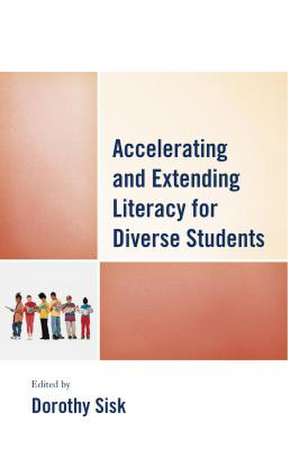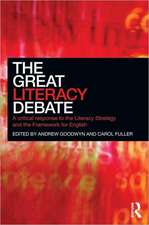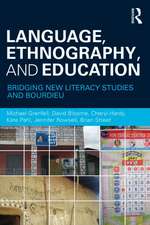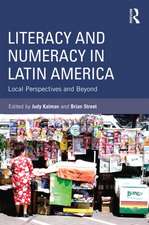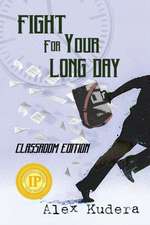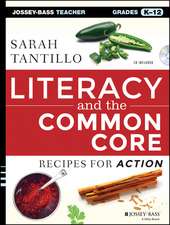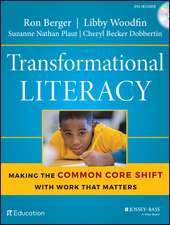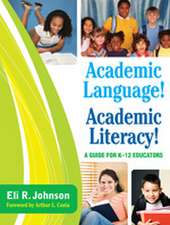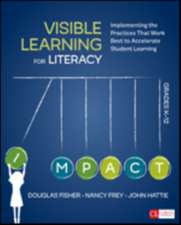Accelerating and Extending Literacy for Diverse Students
en Limba Engleză Hardback – 12 aug 2015
| Toate formatele și edițiile | Preț | Express |
|---|---|---|
| Paperback (1) | 395.06 lei 6-8 săpt. | |
| Rowman & Littlefield – 12 aug 2015 | 395.06 lei 6-8 săpt. | |
| Hardback (1) | 681.12 lei 6-8 săpt. | |
| Rowman & Littlefield – 12 aug 2015 | 681.12 lei 6-8 săpt. |
Preț: 681.12 lei
Preț vechi: 933.04 lei
-27% Nou
Puncte Express: 1022
Preț estimativ în valută:
130.33€ • 136.44$ • 107.84£
130.33€ • 136.44$ • 107.84£
Carte tipărită la comandă
Livrare economică 05-19 aprilie
Preluare comenzi: 021 569.72.76
Specificații
ISBN-13: 9781475817843
ISBN-10: 1475817843
Pagini: 232
Dimensiuni: 152 x 231 x 20 mm
Greutate: 0.48 kg
Editura: Rowman & Littlefield
ISBN-10: 1475817843
Pagini: 232
Dimensiuni: 152 x 231 x 20 mm
Greutate: 0.48 kg
Editura: Rowman & Littlefield
Notă biografică
Edited by Dorothy Sisk
Cuprins
Foreword
Preface
Introduction
Chapter 1- Using Culturally Responsive Teaching to Differentiate and Accelerate Literacy for Diverse Learners
Dorothy A. Sisk
What it means to be culturally sensitive teacher
Importance of the Teacher as the Primary Agent of Change
Culturally Relevant Pedagogy
Culturally Responsive Teaching is Validating
Culturally Responsive Teaching is Comprehensive
Culturally Responsive Teaching is Multidimensional
Culturally Responsive Teaching is Empowering
Culturally Responsive Teaching is Transformative
Culturally Responsive Teaching is Emancipatory
The Challenge of Culturally Responsive Teaching with Students of Poverty
Conclusion
References
Teacher Voice
Read On
Log On
Reflect On
Chapter 2- DISCOVER: A Model for Identifying and Nurturing Strengths in Creative Problem
C. June Maker
Solving across Diverse Domains of Ability
Problem Solving: The Key Construct in Intelligence and Creativity
Designing Challenging Questions and Problems: The DISCOVER Problem Continuum
The Closed Problems
The Semi-Open Problems
The Open-Ended Problems
Performance-Based Assessments of Creative Problem Solving in Human Abilities
Hands-On Activities
Hands-On Assessment Activities for Preschool Children
Oral Linguistic
Math
Spatial
Hands-On Assessment Activities for Elementary and Middle School Students
Spatial Artistic
Spatial Analytical
Oral Linguistic
Hands-On Assessment Activities for High School Students and Adults
Spatial Analytical
Spatial Artistic
Oral Linguistic
Naturalist
Mechanical-Technical
Personal
Paper/Pencil Activities
Paper and Pencil Assessment Activities for Elementary and Middle School Students
Concept Maps
Math
Written Linguistic
Paper and Pencil Assessment Activities for High School Students and Adults
Concept Maps
Math
Written Linguistic
Talent and Ability Profiles
Nurturing the Talents and Strengths of Students: The DISCOVER Curriculum Model
Research on the DISCOVER Model
Assessment
Research on Diverse Students
Conclusion
References
Teacher Voice
Read On
Log On
Reflect On
Chapter 3- Motivating Gifted Readers
Sandra Kaplan and Jessica Manzone
Another Focus on Motivation
Strategies to Increase Student Motivation
Strategy#1 ¿ Student-to-Student Book Messaging
Strategy#2 ¿ Time and Place Reading Decisions:
Strategy#3 ¿ Recognition of Difference in How to Read:
Strategy#4 ¿ Reading Alignment to the Nature of Giftedness:
Strategy#5 ¿ Reading Like a Disciplinarian:
Connections to the Common Core State Standards
Conclusion
References
Teacher Voice
Read On
Log On
Reflect On
Chapter 4- Happy Teachers Will Change the World: Nurturing the Inner Life of Teachers
Michele Kane
Revisiting Research
Reconsider and Reflect on Personal Challenges
Positive Qualities
Red Flags of Ineffective Teaching
Renewing Passion and Purpose for your Profession
Recognizing the Elements of Well-Being
Rekindling Beginner¿s Mind and Remaining Present
Reclaiming Positivity and Well-Being
School Response: Teaching and Learning Increased School¿s Gross National Happiness
Conclusion
References
Teacher Voice
Read On
Log On
Reflect On
Chapter 5- Engaging and Effective Strategies for English Language Learners
Elsa Fernandez Anderson
Developing Critical Thinking
Developing Academic Vocabulary
Developing Literacy
Case Study
Sample of Strategies Incorporating CLD Pedagogy
Strategy: SWIRL
Strategies to move from social to academic language
Strategy: Is it a Fact? ¿Social Language Version
Strategy: Is it a Fact? ¿Academic Language Version
Strategy: Visual Discoveries ¿Social Language Version
Strategy: Visual Discoveries ¿Academic Language Version
Strategy: What¿s the Symbol? ¿ Variation Strategy
Strategy: Words In, Words Out
Strategy: Question Ladders
Conclusion
References
Teacher Voice
Read On
Log On
Reflect On
Chapter 6¿ The Use of Response to Intervention (RtI) to Provide Instruction for Twice-Exceptional Students
Debra A. Troxclair
Diversity-Conformity Paradox
Response to Intervention: Initial Focus on Assessment on Learning Disabilities
Response to Intervention:
Gifted Learners
Twice-Exceptional Gifted Learners
Status of Response to Intervention (RtI) and Gifted Learners
Response to Intervention (RtI) and Literacy Instruction for Twice-Exceptional Learners
Response to Intervention Framework: Identification of Twice-Exceptional GT/LD Students
Response vs. Non-Response Element of (RtI)
Screening for GT/LD
Conclusion
References
Teacher Voice
Read On
Log On
Reflect On
Chapter 7¿ Learning, Reading, and Writing Words Closely and Deeply: The Archaeology of Thought
Shane Templeton
Activities
The First Layer: Latin and Greek Roots and Affixes
Exploring the Layer: Etymology and the Dictionary
More Advanced Etymology: The Assimilation of Prefixes
Serious Archaeology: Indo-European Roots
Application to Learning a New Language
Conclusion
References
Teacher Voice
Read On
Log On
Reflect On
Chapter 8- Academic Language Across the Genre
Eugenia Mora-Flores and Sandra Kaplan
Reading Around the Genre
Academic Language
Academic Language
Role of Academic Language
Connection of Academic Language to Standards
Differentiating Academic Language
Scaffolding
Collaboration
Conclusion
References
Teacher Voice
Read On
Log On
Reflect On
Chapter 9- Using Technology to Accelerate Literacy for Diverse Learners
L. Kay Abernathy
A Literacy Teacher in the Digital Age
History of the Digital Age
Empowering and Emancipatory Effects of Technology
Technology and Global Perspective
Technology, Social Software, and Second Language Learners
Technology and Responsive Pedagogy
Technology, Transformation, and Validation
Assistive Technology and Physical Disabilities
Technology and Digital Stories
Conclusion
References
Teacher Voice
Read On
Log On
Reflect On
Chapter 10- Picture Book Essentials and the English Language Arts Common Core Standards
Laura Beltchenko
A Lens on ELA CCSS and Implications for English Language Learners (ELLs)
Theory into Practice
A Lens on ELA CCSS, Text Complexity and Text Leveling
The Value of Reading Aloud
A Lens on ELA CCSS, Read Alouds, Vocabulary Development, Speaking and Listening
Multicultural Literature Perspective in Children¿s Books
A Lens on ELA CCSS, Culture and Diversity
Books with Pictures, Picture Books, Picture Story Books and Illustrated Books
Supporting Children¿s ZPD through Text and Illustration Interaction
Looking through the Lens of Three Learners
Cognitive and Affective Purpose of Viewing the Picture Book
Conclusion
References
Teacher Voice
Read On
Log On
Reflect On
Chapter 11- Using Visual Literacy and Images as a Gateway to Expand Diverse Students¿ Critical Thinking and Literacy Development
Donna L. Knoell
History of Visuals in the Communication Process
Research and Best Practices
Gateway to Learning for Diverse Students
The Power and Impact of Visual Communication
Classroom Instructional Opportunities: Moving Instructional Potential Forward
Practical Suggestions for Implementing Visual Literacy Skills in Diverse Classrooms
Conclusion
References
Teacher Voice
Read On
Log On
Reflect On
Chapter 12- Using Bibliotherapy to Support the Social and Emotional Needs of Diverse Students
Heather A. Harder
Meeting the Social and Emotional Needs of Diverse Students
Bibliotherapy to the Rescue
Bibliotherapy Defined
Benefits of Bibliotherapy
How Bibliotherapy Works
Creating a Bibliotherapy Plan
Criteria for Selecting Books for Bibliotherapy
Conclusion
References
Recommended picture books to use with culturally and linguistically diverse students
Diversity, Equality & Multicultural Issues
Teacher Voice
Read On
Log On
Reflect On
Chapter 13- Crossing the Divide: Storytelling as a Bridge to Student-Teacher Connection
Marc Kuly
The Divide
A Rationale for Crossing the Divide
Building Bridges: Storytelling in Practice
Conclusion
References
Teacher Voice
Read On
Log On
Reflect On
Chapter 14- Putting it Altogether: Accelerating and Extending the Literacy of Diverse Students
Dorothy Sisk
Conclusion
Descriere
Accelerating and Extending Literacy for Diverse Students addresses the need to equip teachers with the best research and practices to ensure they become dedicated to not just teaching, but knowing and reaching diverse learners.
